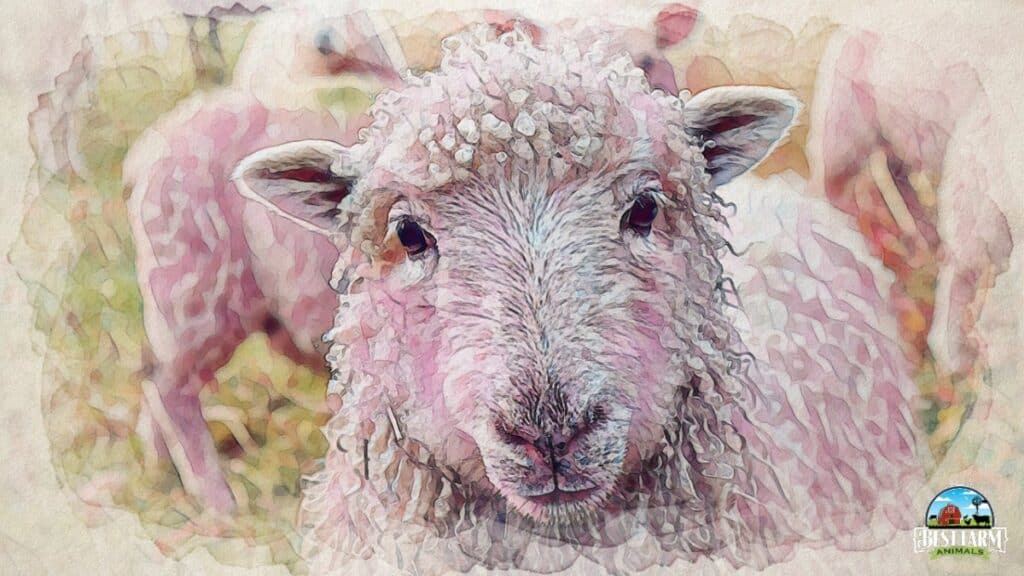Years ago, few imagined sheep as a pet. Now, people opt to bring sheep into their homes or at least their yards rather than just restricting them to the barn.
Can you keep a pet sheep? Sheep can be kept as pets because they are docile and easy to handle. Pet sheep will do best if they are handled from birth and trained as lambs. It’s also important to understand the size that the lamb will become when fully grown. Many varieties of sheep can grow much larger than most people realize.
It’s important to define to what extent you hope to keep sheep as a pet. You may envision keeping sheep as pets outside that your children can care for and handle. Or, you may wonder if having an indoor pet sheep is possible, much like a dog or cat.
If you want to own a pet sheep, there are pros and cons to remember. You also need to know what you need to care for a sheep and how to train and care for them as a pet.
- Do Sheep Make Good Pets?
- Cons of Owning Sheep As House Pets
- Pet Sheep Breeds to Raise Inside a House
- Polled or Horned Sheep As Pets (Pros and Cons)
- The Temperament of The Individual Sheep For Indoor Lambs
- Is an Ewe, Ram, Or Wether Best As A Pet?
- Can I Get Just One Pet Sheep? The Flock Instinct
- What’s The Best Age To Get A Sheep As A Pet?
- Can You Have A Sheep As A House Pet? Where To Keep Your Sheep
- Be Prepared To Bring Home Your Pet Sheep For
- Tips To Training Your Sheep
- Pet Sheep FAQs
- Conclusion
Do Sheep Make Good Pets?
Sheep can make great pets for kids and adults because they are generally mellow and gentle. They are easy to handle and get along with kids and other pets. Sheep can form a strong bond with their owner if they are bottle-fed from a newborn lamb.
Sheep seldom get aggressive. Even rams are usually mellow. Sheep are one of the best farm animals for kids because of how mellow they are.
They are usually easy to handle and are more likely to before afraid than they are to ever be aggressive. As a result, sheep get along with kids and usually get along with animals. (Dogs can be the exception as they often terrify sheep).
Did you know?
Studies have found sheep to have high intelligence and strong memory. They can recognize individual human faces and voices.
They are also empathetic and can build friendships with specific sheep within the flock.
They can even wag their tails when they are pet!
- Gentle Temperament
- Easy to Handle
- Gets Along with Children and Other Pets
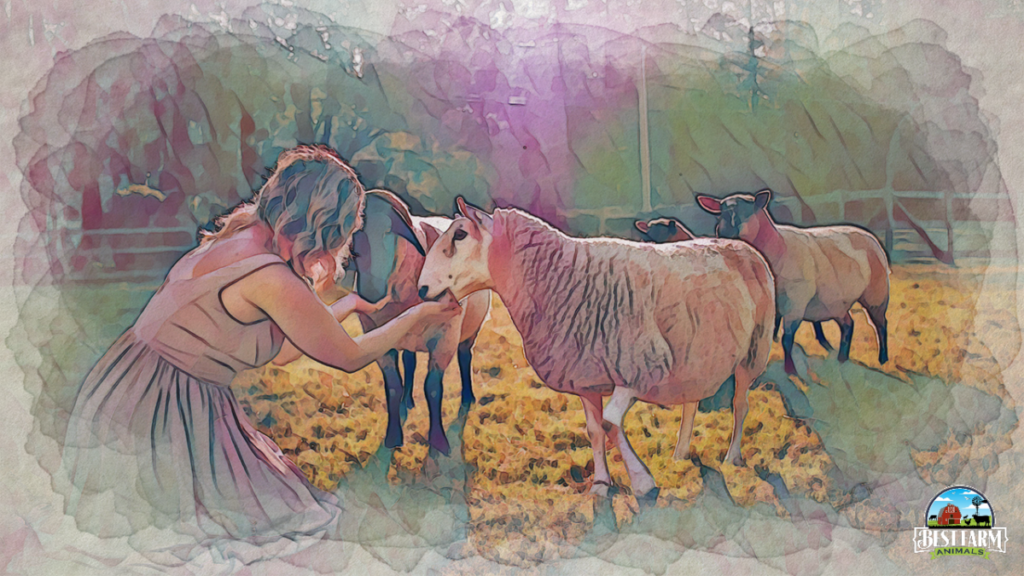
Cons of Owning Sheep As House Pets
If you want your sheep in the house, there be aware of their size, personality, and longevity. Make sure you are committed to having a sheep in the house as it will be different than keeping a house dog or cat.
An indoor lamb will never be the same kind of pet as a dog, more like a big cat. Sheep will remain at least partially aloof.
- Sheep are not as cuddly as dogs are generally
- Sheep have hooves, which can damage and wear out flooring
- Sheep are easily frightened, even when kept as a pet
- Sheep are not easily potty trained
- Housetraining sheep is very difficult, and some say impossible
- Logistical difficulties if you live in a city
- Sheep are not likely to snuggle you or hop in your lap like a dog or a cat would.
- Plus, their hooves are hard and can hurt if they step on you. They can also cause damage to flooring.
- Although sheep have been domesticated for more than 10,000 years ago, they’re still wired to flee when they get scared. This can cause some commotion if you live in a city or suburb where loud noises can frighten your sheep.
If you plan to have sheep as house pets, you should consider how you will keep your house clean from droppings.
I’ve occasionally heard of a house-trained sheep but have not seen it in action. Sheep are very hard to house-train.
Most people with indoor sheep solve this problem by using a disposable diaper with a hole cut out for the tail. As the sheep gets bigger, you can purchase larger diapers.
Pet Sheep Breeds to Raise Inside a House
Can a sheep be an indoor pet? Sheep can be indoor pets, but there are challenges to keeping a sheep in the house. Keeping your belongings safe, managing urine and manure, and house training your sheep are all things you’ll need to address. Smaller sheep breeds are easier than larger breeds to keep indoors. Sheep can also become lonely.
If you plan to raise a sheep in the house as a pet, you must plan for a larger animal as your lamb will grow up. Sheep can grow up to 200 lbs. Many people who want an indoor pet sheep opt for smaller sheep breeds.
Indoor sheep as pets are still more uncommon than outdoor pet sheep. Soay, Shetland, and Oussant Sheep are some of the 5 most popular sheep breeds for indoor pet sheep because they are smaller. The smaller sheep breeds are easier to keep inside.
Polled or Horned Sheep As Pets (Pros and Cons)
You’ll also want to decide if your pet sheep will have horns or be polled. A horned sheep in the house will be much more likely to catch on furniture, curtains, bang into walls, and tear, dent, or damage items in your home.
The Temperament of The Individual Sheep For Indoor Lambs
Examine the behavior of the individual sheep when considering sheep as an indoor pet. It’s especially important to carefully screen an indoor sheep’s temperament before you bring it home. A skittish lamb is much more likely to cause damage to household furniture than a calmer lamb when it grows up.
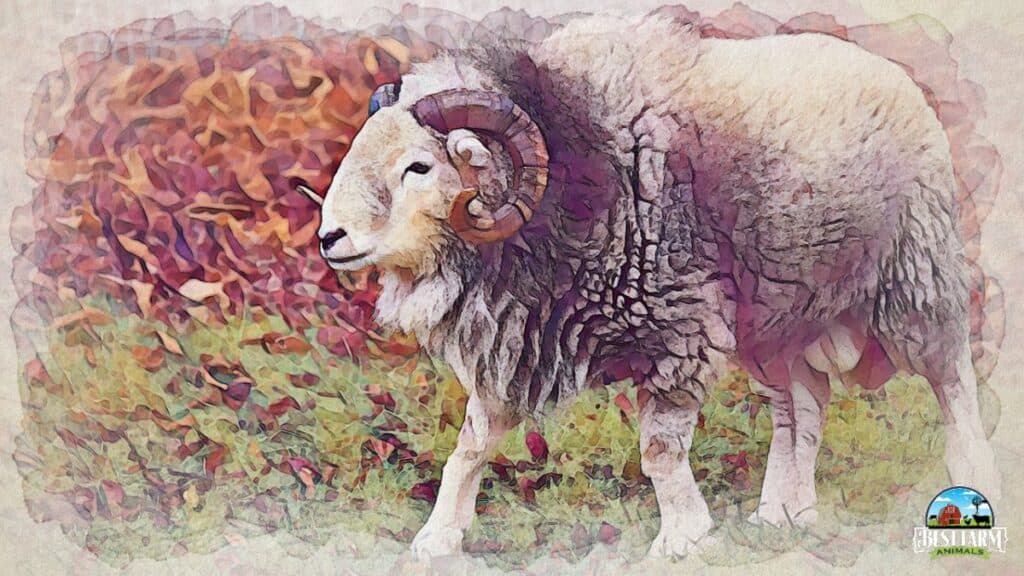
Is an Ewe, Ram, Or Wether Best As A Pet?
Another aspect to consider is the gender of your sheep. Ewes will naturally be smaller than rams in any species. In addition, a fully intact ram will become more aggressive as an adult.
Rams are more likely to be aggressive during the breeding season. Rams will also have a smell around the time they mature. That’s the hormones they exhume.
If you choose to have a male as a pet, you should consider castrating it. Castrated rams are called wethers and will not get as large as adults. They will not be as aggressive or grow as large of horns.
In many cases, if castration is done early enough, the horns won’t grow, but if they have already started growing, they will continue to grow.
And- it starts early!
Can I Get Just One Pet Sheep? The Flock Instinct
It’s important to understand that sheep are very social animals. If you adopt a single sheep as a pet, it will not be happy. Sheep need at least one other sheep to keep it company.
Sheep have a very strong herd instinct. They love to flock together and to have the company of other sheep. It’s ideal to have at least 5 sheep together to flock and keep each other company.
But, if you can’t keep 5 sheep, you should at least keep 2 or 3 sheep together. Research has shown that sheep in flocks of less than 2 are consistently stressed. Three is ideally the smallest flock you should plan to have. A lonely sheep will not be as healthy, will not live as long, and will mope around more.
If you plan to keep your sheep as an indoor pet, plan on keeping two of them together. If you plan to keep them outside as yard pets, then it’s easier to keep more than two sheep as a flock for company.
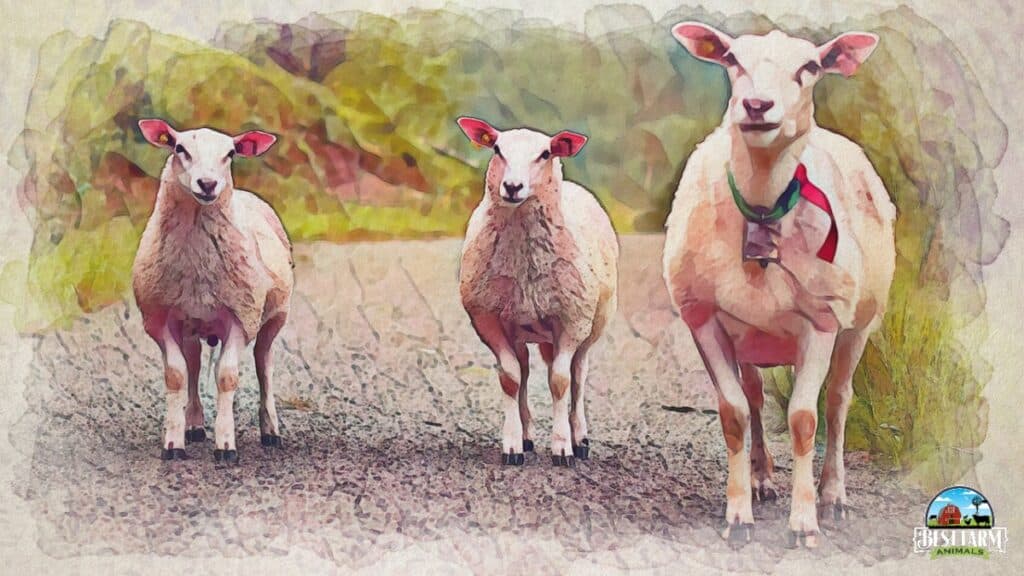
What’s The Best Age To Get A Sheep As A Pet?
You may consider adopting a grown sheep or a lamb, but if you are looking to house-train your sheep, a lamb will be much easier to train.
A young lamb, preferably one still being bottle-fed, will most easily bond to its caretaker.
The younger the lamb, the more it will bond and the more accustomed to people it will be.
Bottle Fed lambs will bond very strongly to its caregiver. It will learn to recognize the voices of the caregiver and to follow to obey it. Shepherds, not sheepherders, in Europe can call their sheep by name and come to the shepherd’s voice and command.
The same can happen if you put in the time and care to pet sheep you adopt.
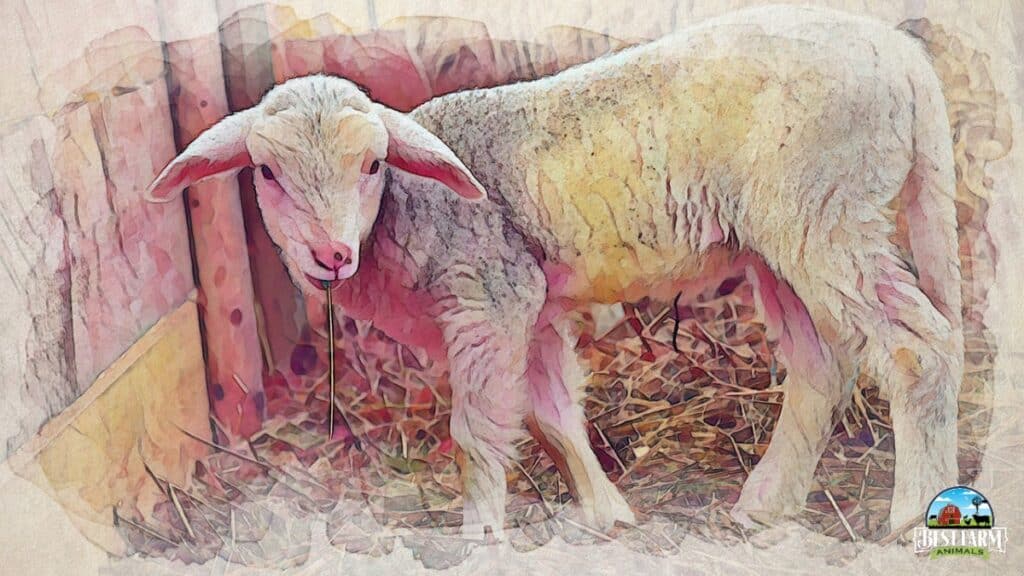
Can You Have A Sheep As A House Pet? Where To Keep Your Sheep
One of the first things to consider is where your sheep will stay. Will you keep it in your house or have an outdoor shelter?
Remember that although you may be happiest inside your house, even a pet sheep might prefer to be outside with the ability to roam around.
A fenced-off yard can provide some freedom to your pet without confining it indoors. Sheep are happiest when they have fresh grass to eat, sunlight, and some space.
Be Prepared To Bring Home Your Pet Sheep For
Before you bring home your pet sheep, you’ll need to ensure you have a safe place fenced off, a shelter from extreme weather (hot and cold) and food for your lamb. Lambs grow fast and sheep eat a lot, so you will probably want to ensure you have adequate pasture or enough hay for your sheep.
In addition, make sure you have at least a basic knowledge of your sheep’s other needs. Locate the resources you need locally for shearing, hoof trimming, deworming, and vaccinations recommended for your locality.
Be aware of local laws and ordinances around raising sheep, and check your yard and property to ensure you aren’t growing poisonous bushes, flowers, or plants that will harm your lamb if it escapes it’s fenced area.
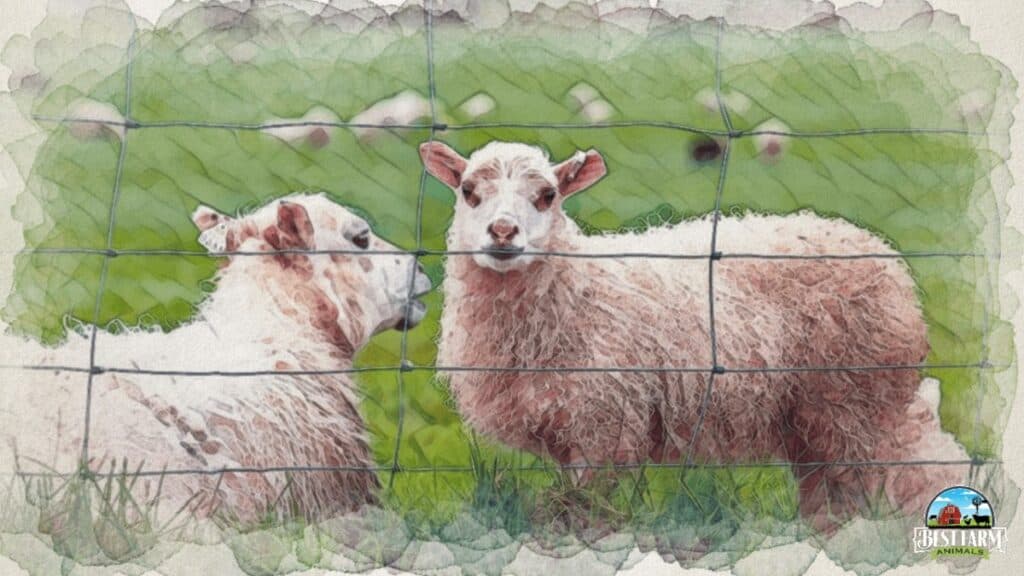
Tips To Training Your Sheep
It’s important to train your sheep so they’re easier to manage and you can actually enjoy having them as a pet. Sheep do better with routine and training anyways.
It may take some practice but with a few practice runs at a new behavior and many positive rewards, you’ll have a trained sheep. For positive rewards, sheep especially appreciate treats like some extra grain.
Putting the grain in a bucket and rattling it while calling your sheep is one way to start training the desired behavior. Some sheep also appreciate an extra scratch but start under the chin and work up to the head to avoid getting head-butted. Headbutting seems to be the natural reaction anytime you move a sheep’s head.
Think motivational training rather than negative reinforcement when it comes to training your sheep. Keep calm and repeat, repeat, repeat. Sheep are not people pleasers like other household pets so it will take some work but they can be trained.
Pet Sheep FAQs
Check out these common questions about raising sheep as pets!
Do Pet Sheep Have To Be Tagged?
All sheep, even pets, must be tagged if they are over a year old or leave your property. Tagging is required to identify the flock of origin in the case of a scabies outbreak or other reproductive diseases. You may be able to “get away” with not tagging a pet sheep, but if caught, you may face state fines.
What is the Lifespan of a Pet Sheep?
Generally, pet sheep live 15-20 years because of the increased care given to them that farm sheep are not given. Pet sheep owners are more apt to pay for veterinary care, provide custom diets, and build a living space best suited to the sheep’s needs. Some pet sheep live as long as 23 years. Farm sheep are not usually given vet care as it has to be evaluated on a cost basis for the overall well-being of the farm.
Are Sheep Friendly?
Sheep are docile and friendly animals. They are placid, gentle, affectionate, amenable, and social animals that enjoy being around humans to get fussed and cuddled. Sheep can recognize human faces and emotions and will get excited whenever you come back home. Castrated rams, lambs, and ewes can get along well with your kids.
What Kind of Milk Can I Feed Baby Sheep?
Lambs can’t drink any milk. They need a special lamb formula. It has a specific fat level, certain lactose levels, and specific acids formulated specifically for a lamb’s growth.
The replacement milk normally comes as a powder and you mix it with water.
Check out my resources page for specific product suggestions.
How Can I tell if my sheep is sick?
There are several signs your sheep may be sick.
- Isolates itself (can also occur when a ewe is ready to give birth)
- Stops eating
- Hangs its head
- Ears and tail may droop
- Teeth grinding
Conclusion
Sheep are among the best animals to keep as pets because of their placid nature. They can be a great companion to your children and other pets. Ensure your pet sheep are healthy so they don’t infect your kids.
You can shear your lamb annually, trim their hooves, vaccinate, and deworm them as required. Don’t forget to take care of their nutritional needs and treat them when they show signs of sickness. Above all, choose the right sheep breed to keep as pets. If you have any concerns, it’s always best to check in with your veterinarian. Don’t forget to check out our Raising Sheep Resource Page.
My Essential Sheep Supplies
This list contains affiliate products. Affiliate products do not cost more but helps to support BestFarmAnimals and our goal to provide farm animal owners with accurate and helpful information.
This little giant bucket fits on a fence and this one’s easy to carry.
A sturdy dog collar is essential. Don’t do rope (they’ll break and tangle) or chain (injury!).
A Black Water Tub is way nicer than buckets that tip over. I like to get a 20 or 30-gallon in each pen so my goats have plenty of water, but you can get 100-gallons if you have a lot of sheep in one pen.
Loose minerals in a small bag or a Purina 50 lb bag, and a mineral feeder for free-choice is the best option. One side holds minerals, and the other holds baking soda. Don’t feed sheep goat minerals because it usually contains copper- something that is fatal to sheep.
Hoof trimmers are a necessity because you’ll need to trim your sheep’s hooves every few months. These are nice for the price.
Shearers like these aren’t too costly but do a decent job. Sheep wool jams normal shearers and once you are ready, I’d recommend the ones from Premier 1 Supplies.
Don’t make the mistake I made by waiting to order a drench gun before you need it. I was surprised by how often I use it. It helps with bloating, dehydration, and other ailments. Here’s a good drench, but you can also drench a bloat solution or water if dehydrated.
Digital Thermometor for when your lambs act sick. You’ll need to know if their temps are too low or too high so you can accurately diagnose the issues.
Vetericyn for wound care. It makes a big difference in a speedy recovery.
These heavy duty clips for fences, to clip ropes to collars, and a million other uses. They are stronger than carabeeners, which we broke a dozen of before switching to these.

